JF Ptak Science Books LLC Post 929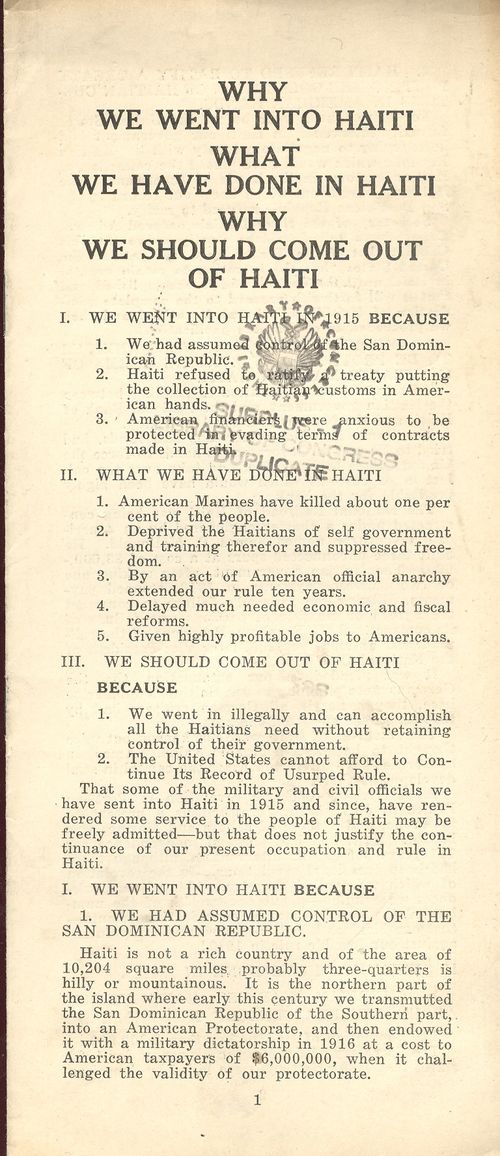
I spent 33 years and four months in active military service and during that period I spent most of my time as a high class muscle man for Big Business, for Wall Street and the bankers. In short, I was a racketeer, a gangster for capitalism.--Marine Corps Major General and two-time Medal of Honor recipient Smedley Butler, from his 1935 book War is a Racket.1
This small pamphlet (reprinted below in continued reading)--printed in 1929 and once owned by H.L. Mencken, and with his annotations--is a gonzo screed against American imperialism in Haiti produced by "The People's Lobby" and headed by Prof. John Dewey.2
This “intervention”, an extension
of American hegemony in the
After a series of six failed Haitian
governments in five years, President Woodrow Wilson felt the stinging itch of
capital protection and ordered the occupation of
The pamphlet is effective as an
anti-Imperialist proto-gonzo work, though it does leave some gaping holes in
fact and some narrow ones in fiction. Be
that as it may the anonymous author incites indignation with the outrages of
the American occupation, not the least of which is the usurpation of Haitian sovereignty.
The occupation of Haiti left broad scars along with the new and vastly improved infrastructure, which was probably just a colonial remnant of the necessities of governance by the occupying force. After all, we needed roads and bridges and such to secure the possession, and it isn't as though we could role them all up and take them home at the end of the day. They were more cenotaphs to an unwanted and shameful legacy than the betterment of Haiti's social structure. To close with Mr. Mencken, the flowers that came with the American occupation make us look more for the coffins than anything else.4
Notes:
1. In 1935, Butler wrote in his famous book War Is a Racket: "I spent 33 years and four months in active military service and during that period I spent most of my time as a high class muscle man for Big Business, for Wall Street and the bankers. In short, I was a racketeer, a gangster for capitalism. I helped make Mexico and especially Tampico safe for American oil interests in 1914. I helped make Haiti and Cuba a decent place for the National City Bank boys to collect revenues in. I helped in the raping of half a dozen Central American republics for the benefit of Wall Street. I helped purify Nicaragua for the International Banking House of Brown Brothers in 1902-1912. I brought light to the Dominican Republic for the American sugar interests in 1916. I helped make Honduras right for the American fruit companies in 1903. In China in 1927 I helped see to it that Standard Oil went on its way unmolested. Looking back on it, I might have given Al Capone a few hints. The best he could do was to operate his racket in three districts. I operated on three continents.
2. Just to note that this was the John Dewey, one of founders—along with the great Charles Sanders Peirce and William James-- of the philosophy of pragmatism.
3. Mr. Mencken also made the following Modest Proposal: "It seems to me that the United States would be a great deal better off today if it had a war on its hands, somewhere or other, all the time. I do not mean, of course, such puerile buffoonery as now goes on from time to time in Nicaragua and Haiti, but real war, occupying say a quarter of a million or half a million men." "Editorials" in the The American Mercury, Nov 30, p.284
4. As in his Bierce-like dictum "A cynic is a man who, smelling a flower, looks for the coffin".


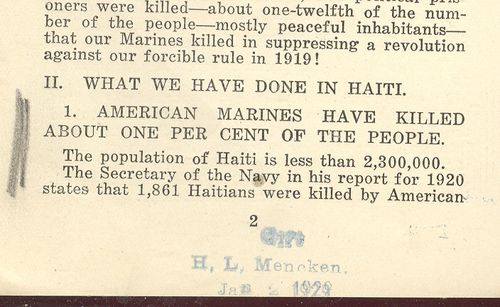
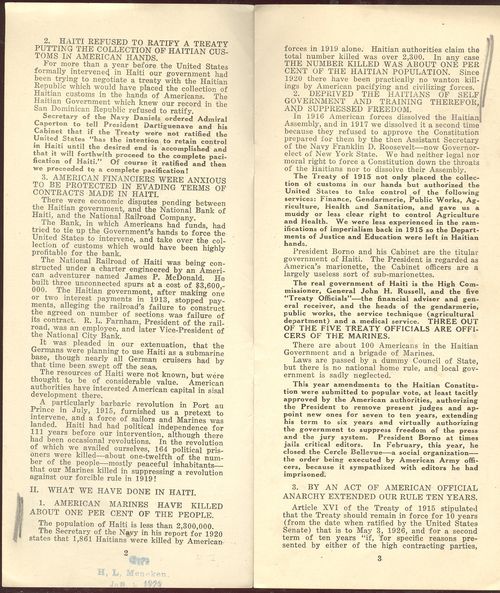
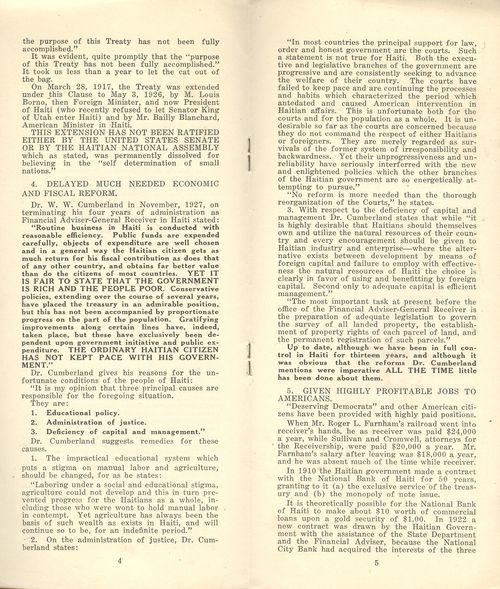
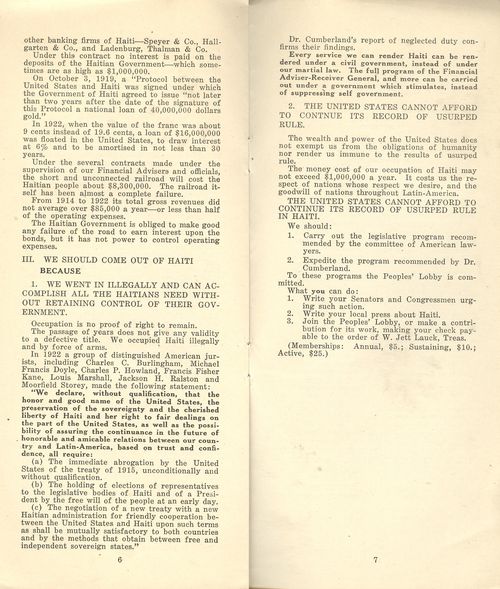
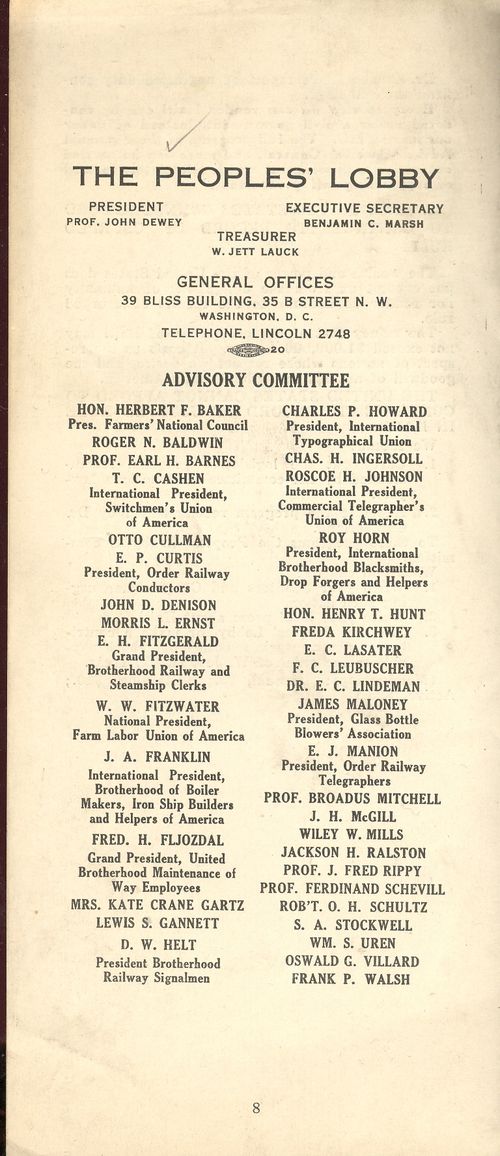

This is in an era given prominent mention in James W Loewen's Lies My Teacher Told Me, an expose of historical whitewashing in US school textbooks:
"What we did not learn about Woodrow Wilson is even more remarkable. When I ask my college students to tell me what they recall about President Wilson, they respond with enthusiasm. They say that Wilson led our country reluctantly into World War I and after the war led the struggle nationally and internationally to establish the League of Nations. They associate Wilson with progressive causes like women's suffrage. A handful of students recall the Wilson administration's Palmer Raids against left-wing unions. But my students seldom know or speak about two antidemocratic policies that Wilson carried out: his racial segregation of the federal government and his military interventions in foreign countries.
"Under Wilson, the United States intervened in Latin America more often than at any other time in our history. We landed troops in Mexico in 1914, Haiti in 1915, the Dominican Republic in 1916, Mexico again in 1916 (and nine more times before the end of Wilson's presidency), Cuba in 1917, and Panama in 1918. Throughout his administration Wilson maintained forces in Nicaragua, using them to determine Nicaragua's president and to force passage of a treaty preferential to the United States."
Posted by: Ray Girvan | 05 February 2010 at 05:56 AM
Happy birthday, Ray!
Thanks for this addition. All of this of course is true, and I'm not quite sure how Wilson dragged himself into the League of Nations with such bulky luggage. For all of his lofty language and ideals he shared not so much of them with folks in this hemisphere.
Posted by: John F. Ptak | 05 February 2010 at 08:00 PM
Lofty language and ideals are ALWAYS for other people to live up to. I proceed with that expectation, anyway. If I'm going to spend time and energy coming up with an expansive, high-minded idea, I expect someone to follow it.
Posted by: Jeff Donlan | 06 February 2010 at 05:27 PM
"Happy birthday, Ray!"
Thanks! I'd forgotten FaceBook gave that away - eeurgh, 54 (I'm still 18 inside).
It's a very interesting, quite possibly pivotal, era in US history that saw socialist movements stamped on. Newman & Byrne's "Back in the USSA" - http://segalbooks.blogspot.com/2008/07/newman-byrne-alternate-histories.html - is a lovely pastiche and exploration of the idea.
Posted by: Ray Girvan | 06 February 2010 at 07:48 PM